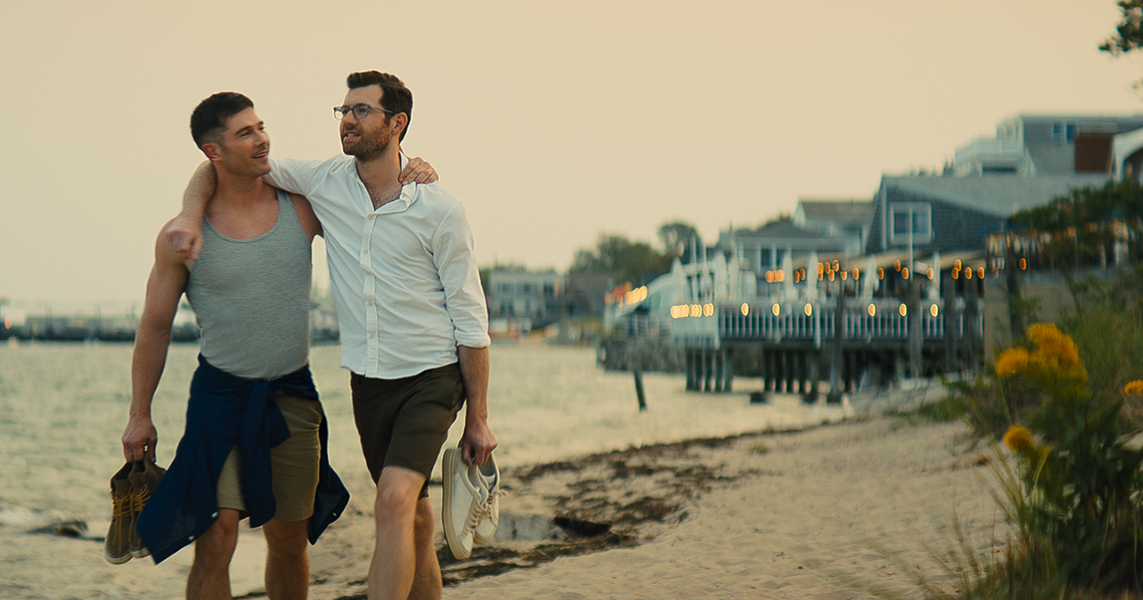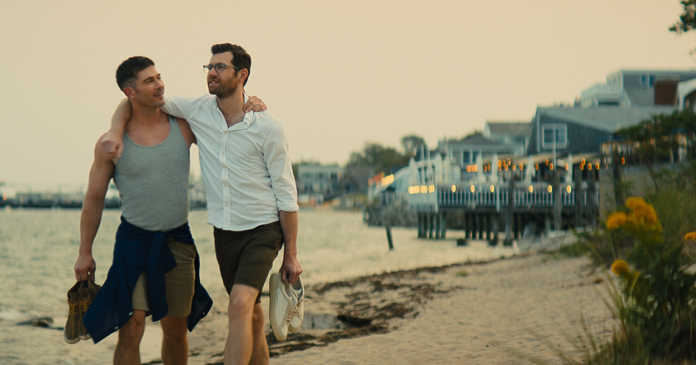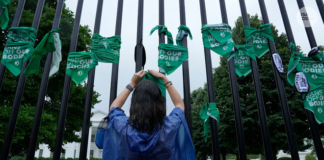
When the Bros crew contacted the Provincetown Tourist Office in June 2021, Yingling was one of the first vendors considered for the film. “They approached me completely cold,” Yingling said. “They just came one day, and they were looking for the manager. When they started talking about, what kind of film this was going to be and how important it is for Hollywood to have films like this, I was really excited to work with them.”
The film is touted to be the first gay romantic comedy backed by a major studio, Universal, with an openly LGBTQ cast, and which is getting a wide theatrical release, and is suffused with an blinding awareness of that. Casting Bobby as a curator of an LGBTQ+ history museum, the first of its kind, explicitly aligns itself with its own impression of where it will fit into (queer, film) history, and how it wants to shape and be shaped by it, as well.
There’s an irony here though: While it, in its brief literal screen time (about 10ish minutes), illustrates the place as a goofy gay time, it’s the scene with Bowen Yang’s wealthy producer that gestures towards the more complicated reality of Provincetown, beyond its reputation as a haven. When introducing Yang’s character, he argues with a neighbor about a bush and where it falls on the border between their properties, as if to imply the petty bourgeois turf wars have leaked into gay culture. It’s a clever joke, and generously reads as an amusing critique of the kind of people that have come to dominate the area. (“Beige dentists,” a friend once quipped to me to describe who often bought property in town.)
Bros, regardless of quality, is a film that inserts itself into and asserts itself as history and utopian in a way, like the town it features. And those qualities don’t not exist there: P-Town was, for this writer, truly a home when I needed it at a critical point in my life. I spent two summers working and living in town, and it’s one of my favorite places on earth. You can as easily get lost in the bustling crowd of tourists as you can find a quiet spot to have a sandwich while watching the sunset. Its adaptability for different kinds of queerness made it easy and comfortable for me to find friends, from people who stopped by for a weekend to other people hustling through the summer. On Fridays at 11, I’d go to a packed Grotto Bar and lose my voice at Scream Along with Billy, where musicians Billy Hough, Sue Goldberg, and their friends tear through a stripped-down version of an album, from Fleetwood Mac’s Rumors to Prince’s Purple Rain. It taught me about the kind of queer person I wanted to be and what I wanted out of community. But, like the state of many queer destinations, its accessibility has changed dramatically over time.
In Welcome to Provincetown, a podcast by Mitra Kaboli, the host trails several characters who make the living there, across gender, age, and race, seeing just what it takes to make it there. But with housing markets skyrocketing (average cost of a home is $876,000, up around $100,000 from Boston), amplified by wealthy residents buying houses that are used only during the summer and abandoned the rest of the year, being able to experience that utopia for young queer people themselves is becoming increasingly difficult, not helped by the fact that it caters heavily towards white cis gay men. (The demographic often skews somewhat older than, say, Fire Island.) But Kristen Becker, an important character on the podcast, is doing what she can to make it available to the young people who might need it most with her relocation program, Summer of Sass, which helps young people with housing and finding a job.
I went back to Provincetown a few weeks ago and got to show some of my closest New York friends the place that made me. It had changed and it didn’t, as always. Even in brief, that contradiction is evident in the film, the large house of an industry tycoon down the road from a cute pizza place. As stores come in and out or manage to stay open year after year, and the crowd goes up and down Commercial Street like a river whose direction changes whenever Tea Dance, the famous outdoor dance party, is, Provincetown is always in conversation with itself, thinking about how it can continue to serve queer people, wondering what it will become next.







